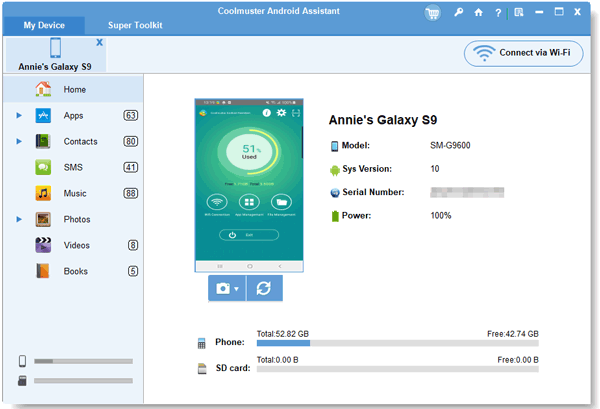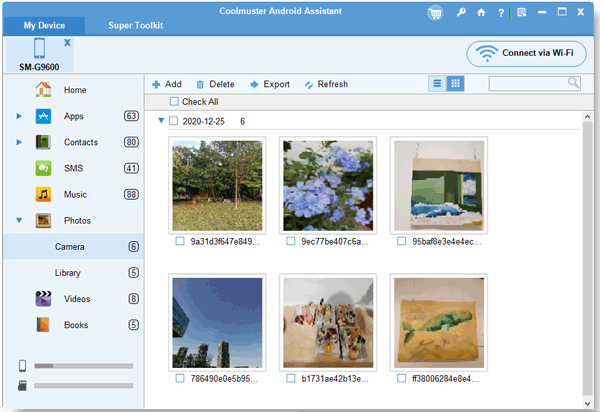Google Photos, a widely used platform, offers seamless syncing capabilities, ensuring that our cherished memories are safely stored in the cloud. However, there are instances when one might wish to regain control over this automatic syncing process. Whether it's to conserve device storage, limit data usage, or simply opt for an alternative photo management approach, the need to unsync Google Photos arises.
Now, we will explore the reasons behind wanting to unsync, followed by step-by-step instructions for Android, iPhone, and computer users.

Before we embark on the journey of unsyncing Google Photos, understanding the motivations behind such a decision is crucial.
Conserving Device Storage: Continuous syncing of photos to the cloud can occupy significant space on the device. Unsyncing is a way to save local storage for other applications and files.
Data Usage Concerns: Automatic syncing can consume mobile data, especially when uploading large photo collections. Unsyncing helps users manage their data usage more efficiently.
Privacy Preferences: Some individuals may have privacy concerns related to storing personal photos in the cloud. Unsyncing provides a way to keep photos exclusively on the device.
Prefer Local Management: Users who prefer managing their photos manually on their devices rather than relying on cloud services may choose to unsync Google Photos.
Alternative Cloud Services: Some users may opt for other cloud storage services that better align with their preferences or offer different features, prompting them to discontinue Google Photos syncing.
Organizational Control: Unsyncing allows users to have more control over the organization and categorization of their photos without the automatic cloud-based sorting features of Google Photos.
Limited Connectivity: In areas with limited or unreliable internet connectivity, users might find unsyncing a practical solution to avoid disruptions in the syncing process.
Security Concerns: Although Google Photos has security measures in place, some users may feel more secure keeping their photos solely on their devices, particularly if they are wary of potential data breaches or unauthorized access.
Desire for Manual Backups: Individuals who prefer manual backup processes or periodic transfers to external storage may choose to unsync Google Photos for a more hands-on approach to data management.
Migration to Different Services: Users may be exploring alternative platforms or transitioning to different cloud storage services, leading them to discontinue syncing with Google Photos.
See more: How to Move Photos from Google Drive to Google Photos Without Hassle
For Android users looking to regain control over their photo syncing, this part provides a detailed guide on how to unsync Google Photos from Android. With a step-by-step explanation, you will learn to navigate the settings on their Android devices, disable backup and sync, and gain autonomy over their photo storage preferences.
Step 1: Open the Google Photos app on an Android phone or tablet, and then make sure you have signed in with your Google account.
Step 2: Click your profile icon on the app, and click "Photos settings" > "Back up & sync".

Step 3: Finally, turn off the "Back up & sync" feature. Then Google Photos will not sync your pictures.

Read also: You can fix Google Photos with these tricks if it gets stuck.
"How do I unsync Google Photos on my iPhone?" Not to be left behind, iPhone users seeking to unsync their photos will find guidance in this part. This section walks you through the steps to unsync Google Photos syncing on iPhones. From accessing the app settings to turning off the backup and sync feature, iPhone users will discover a straightforward approach to managing their photo storage preferences. Whether you're a loyal Apple aficionado or a recent convert, this section empowers iPhone users to take charge of their Google Photos syncing settings.
Step 1: Launch Google Photos on your iOS device, and click your profile image.
Step 2: Choose the "Google Photos settings" option.
Step 3: Click "Backup" and switch it off. Then Google Photos will unsync your photos on the iPhone.

Further reading: What about transferring Google Photos to iCloud? Is there any method to do it?
Acknowledging the diversity of user preferences, Part 4 caters to those who prefer managing their photos from a computer. In general, when you sync photos from your computer to Google Photos, you need to browse the website of Google Photos and upload the images manually.
In other words, the unsyncing on Google Photos means that you don't upload the pictures, since there is no auto-sync feature on Google Photos for computers. Google Photos won't synchronize your PC or Mac's pictures. If you want to use the auto-sync feature of Google Photos, you need to download and install Google Drive for desktop.

Q1: Will unsyncing Google Photos delete my existing photos?
No, unsyncing Google Photos will not delete your existing photos. It only stops new photos from being automatically backed up to Google Photos.
Q2: Will unsyncing Google Photos affect photos on other devices?
Yes, if you unsync Google Photos, it will affect all devices connected to the same Google account. Changes made on one device will reflect on others.
Q3: What happens if I clear Google Photos app data?
Clearing app data removes the app's settings but not your photos. You may need to sign in again, and the app will reset to its default state.
Q4: Can I unsync Google Photos for specific albums only?
No, the unsyncing process is usually applied globally to Google Photos. You can, however, manually delete specific photos or albums from the app.
You can also sync and organize your Android photos without Google Photos because some utilizing a Android data manager - Samsung Messages Backup can also make it easy. With this tool, you can transfer photos from Android to a computer and vice versa, create picture albums to sort out your photos, remove the unwanted images, etc.
- Back up all Android photos to a computer in 1 click.
- Selectively transfer photos between Android devices and computers.
- Keep your photos with original formats and quality.
- Allow you to use USB or Wi-Fi to transfer your photos.
- Not only support pictures but also manage and transfer contacts, videos, apps, music, SMS, documents, etc.
- Most Android devices are compatible with it, including Samsung Galaxy A25/A15/A9/A05s/A05/A54/A34/A24/A14, Galaxy S23 Ultra/S23/S22/S21/S20/S10/S9, OnePlus 12/12R/Ace 2 Pro/Ace 2V/Ace 2/Ace 2/Ace Pro/Nord CE3, Sony Xperia 1 V/ Xperia 10 V/Xperia 5 V/Xperia 1 IV/Xperia 5 IV/Xperia 10 IV/Xperia Pro-I/Xperia 1 III/Xperia 1 II, ZTE, OPPO, T-Mobile, Vivo, Honor, Xiaomi, and more.
Download the Android photo manager.
Step 1: Install the photo transfer software on your computer, run it and click the "Android Assistant" module.
Step 2: Connect an Android device to the computer with a data cable. Then choose "MTP" and enable the USB debugging feature on the mobile device. The program will recognize the device fast.

Step 3: Click "Photos" > "Camera" or "Library" to select the photos you want to transfer. Finally, tap the "Export" icon to save them to your computer.

The ability to tailor our syncing preferences is a powerful tool. Whether motivated by the desire for more control, a need to conserve storage, or simply a preference for alternative solutions, unsyncing Google Photos is a step towards personalizing your digital experience. Armed with the insights provided in this guide, you are now ready to stop syncing Google Photos on your Android, iOS and computer devices.
As you desire a tool to sync photos from Android to a computer, Samsung Messages Backup is at your hand. It is a powerful alternative to Google Photos. Remember that technology is here to serve you, and the power to shape your digital world is in your hands.
Related Articles
Recover Permanently Deleted Photos from Google Photos Safely
How to Sync Samsung Contacts to Google: 4 Hassle-free Methods
How to Restore Android Phone from Google Backup (Accurate Steps)
Full Explanation: How to Transfer Photos from iPhone to Android
How to Move Photos from Google Photos to Gallery on Different Devices
Save Photos from WhatsApp in 4 Functional Ways - Preserving Memories
Copyright © samsung-messages-backup.com All Rights Reserved.